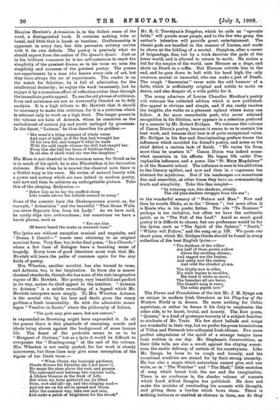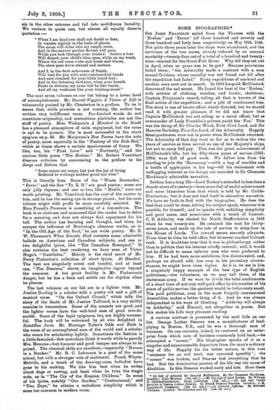RECENT VERSE.*
THE verse of a distinguished prose-writer deserves to be treated with all respect. Even if it fails as poetry, it will not be without its quality, for the writer, though dealing with a leas familiar form, will still be the artist in words. Mr.
• (1) Artemision Idylls and Songs. By Maurice Hewlett. London Elkin Mathews. [3s. 6d. net.]—(2) Artemis to Actaeon. and other Terse. By Edith Wharton. London Macmillan and Co. ['4s. 6d. net.J—(3) Sisyphus : an Operatic Fable. By B. C. Trovelyan. London : Longmans and Co. f 5s. net.] —(4) The Poems and Sonnets of Louise Chandler Moulton. London: Macmillan and Co. [7s. 6d.]—(5) Selected Poems of B. W. Dixon. Memoir by Robert Bridges. London : Smith, Elder, and Co. [4s. 6d_ net.]—(6) Poems and Translations. By John hi. Synge. Dundrum : Coals Press. [10s. 6d.]—
(7) Insurrections. By James Stephens. Dublin: Maunsel and Co. [Is. net. 1—
(8) Sonnets. By Lord Allred Douglas. Loudon Academy Publishing Company. 6d. net.]—(9) A Vision of Ltfe. By Darrell Figgie. London: John Lace. 3s. 6d. net.]—(10) A Minstrel in the South. By Millicent Wedmore. London: Smith, Elder, and Co. [2s. 6d. net.]—(11) New Poems. By J. Marjoram. London Duckworth and Co. [is. net.] —(12) Songs and Satires.
By Hobert Vansittart. London A. L. Humphreys. 6d. netj-
(13) Personae. By Ezra Pound. London : Elkin Mathews. is. 6d. net. 1— (14) When Lincoln- Died. and other Poems. By Edward William Thomson. London : Houghton, Mifflin, and Co. [5e. net.]—()5) At Hasebre, and other Poems. By Percy Pinkerton. Enfold: The Car Press. [3s. net.]—(16) On the Orford Circuit, and other Verses. By the Hon. Mr. Justice Darling. London: Smith, Elder, and Go. [58. net.] —(17) Oddiond Ends. By B. Montagu Tabor. London : Longsnans and Co. [58.]—(18) Light and Shade, and other Poems. By B. C. Lehmann, London: W. Blackwood and Sons. [5s. net.] Maurice Hewlett's Artemision. is, in the fullest sense of the word, a distinguished book. It contains nothing trite or banal, and little that is harsh or tuneless. Craftsmanship is apparent in every line, but this pervasive artistry carries with it its own defects. The poetry is precisely what we should expect from the author of The Queen's Quair. Just as in his brilliant romances he is too self-conscious to reach the simplicity of the greatest drama, so in his verse we miss the simplicity and sureness of the greatest poetry. The poems are experiments by a man who knows every rule of art, but they have always the air of experiments. The reader is on the watch for felicities ; be is full of admiration for the intellectual dexterity; be enjoys the work immensely, but he enjoys it by a conscious effort of reflection rather than through thsimmediate poetic appeal. To use the old phrase of criticism, form and substance are not so irrevocably blended as to defy analysis. It is a high tribute to Mr. Hewlett that it should be necessary to make this criticism, for it is a criticism which is relevant only to work on a high level. The longer poems in the volume are tales of Artemis, whom he conceives as the embodiment of natural joy and youth untinged by grossness. In the finest, "Latmos," he thus describes his goddess :— "She seem'd a thing compact of windy water
And rays of light, as if the Sun had wrought her Of his own fire, and temper'd what he made With the cold ripple whence his skill had caught her. From him she had her beam of falchion-blade, In all else of shrill wind she was the daughter."
His Muse is not classical in the common sense, for Greek as he is in much of his spirit, he is also Elizabethan in his decorative richness. Even when he is nearest the classical note there is a Gothic tang in his verse. He writes of natural beauty with a power and ecstasy which are rare indeed in modern poetry, and now and then be achieves an unforgettable picture. Take this of the sleeping Endymion :— "Below him as he lay the muffled sheep
Like tombs adown the hillside seemed to creep."
Some of the sonnets have the Shakespearean accent, as, for example, " Artemision " and the beautiful "That Stone Walls can never Separate him from his Lady." As we have said, he rarely slips into awkwardness; but sometimes we have a harsh phrase, such as
"Ere one hiss
Of terror bared the snake in mannish tune."
The lyrics are without exception musical and exquisite, and "Donna è Gentil— " comes near attaining to an original metrical form. Very fine, too, is the final poem, "In a Church," where a few lines of dialogue leave a haunting sense of tragedy. Every lover of good literature must wish that Mr. Hewlett will leave the paths of romance again for the airy fields of poetry.
Mrs. Wharton, another novelist, has also turned to verse, and Artemis, too, is her inspiration. In form she is nearer classical standards, though she has none of the rich imaginative vigour of Mr. Hewlett. Her poetry, very beautiful and perfect in its way, makes its chief appeal to the intellect. "Artemis to Actaeon" is a subtle re-reading of a legend which Mr. Hewlett interprets more simply. To Mrs. Wharton Actaeon is the mortal who by his love and death gives the weary goddess a fresh immortality. So with the admirable mono- logue " Vesalius in Zante," where the philosophy of failure,
"The gods may give anew, but not restore,"
is expounded as Browning might have expounded it. In all the poems there is this plenitude of reasoning, creeds and ideals being shown against the background of some human life. The finest of the portraits seems to us to be "Margaret of Cortona," but as a lyric it would be difficult to overpraise the "Hunting-song" at the end of the volume. Mrs. Wharton is not easily quoted, for her work is closely interwoven, but these lines may give some conception of the vigour of her blank verse :—
" When Christ, the heavenly gardener, Plucks flowers for Paradise (do I not know ?), He snaps the stem above the root, and presses The ransomed soul between two convent walls, A lifeless blossom in the Book of Life. But when my lover gathered me, he lifted Stem, root and all—ay, and the clinging mud— And set me on his sill to spread and bloom After the common way, take sun and rain, And make a patch of brightness for the street.*
Mr. R. C. Trevelyan's Sisyphus, which he calls an "operatic fable," will puzzle most people, and to the few who grasp the author's intention will provide great entertainment. The classic gods are handled in the manner of Lucian, and made to clown at the bidding of a mortal. Sisyphus, after a career of brigandage, dies, but by a trick deceives the gods of the lower world, and is allowed to return to earth. He makes a. bid for the empire of the world, uses Hermes as a dupe, and shuts up Death in a coffin. But Hermes outwits him in the end, and he goes down to bell with his head high, the only creature, mortal or immortal, who can make a jest of Death.
The rough " fescennine" verse suits the odd humour of a. fable, which is sufficiently original and subtle to make us desire, and also despair of, a wide public for it.
The many admirers of Louise Chandler Moulton's poetry will welcome the collected edition which is now published. Her appeal is obvious and simple, and if she rarely reaches the heights, she walks on a pleasant upland where many can. follow. A far more remarkable poet, who never attained. recognition in his lifetime, now appears in a selection prefaced by a memoir by Mr. Robert Bridges. We welcome this volume of Canon Dixon's poetry, because it seems to us to contain his best work, and because that best is of quite exceptional value.
Mr. Bridges in his fine and discriminating preface traces the influences which moulded his friend's poetry, and notes as his chief defect a certain lack of finish. "He varies his form. more than he masters it." Canon Dixon was indeed some- what uncertain in his effects. He began life under Pre- raphaelite influence, and a poem like "St. Mary Magdalene" is of the Rossetti school. The influence is seen in his addiction to the literary epithet, and now and then in a vagueness too abstract for mysticism. But if his landscapes are sometimes dim and unearthly, at other times they have an overmastering truth and simplicity. Take this fine couplet-
" In tottering row, like shadows, silently
The old pine-timbers struggle from the sea";
or the wonderful scenery of "Nature and Man." Now and
then be recalls Blake, as in the " Dream " ; but more often it is Keats who is his poetic father. The ode "To Summer" perhaps is too imitative, but often we have the authentic spirit, as in "The Fall of the Leaf." Amid so much good.
poetry it is difficult to choose, but our preference would be for the lyrics, such as "The Spirit of the Sphere," "Death," "Winter will Follow," and the song on p. 139. We quote one short piece, which Mr. Bridges thinks should be found in every collection of the best English lyrics :—
"The feathers of the willow
Are half of them grown yellow Above the swelling stream; And ragged are the bushes, And rusty now the rushes, And wild the clouded glcam.
The thistle now is older, His stalk begins to moulder, His head is white as snow; The branches all are barer, The linnet's song is rarer, The robin pipeth now."
The Poems and Translations of the late Mr. J. M. Synge are as unique in modern Irish literature as his Play-boy of the Western World is in drama. He cares nothing for Celtic mysticism, or rather he deems it his duty to emphasise the other side, to be harsh, brutal, and homely. The first poem, "Queens," is a kind of grotesque travesty of a subject familiar to students of Mr. Yeats. His few short ballads and songs- are wonderful in their way, but we prefer his prose translations of Villon and Petrarch into colloquial Irish idioms. Few more perfect adaptations of the spirit of a strange tongue have been written in our day. Mr. Stephens's Insurrections, as their title tells, are also a revolt against the cloying sweet- ness, the exotic delicacy, of certain of his countrymen. Like Mr. Synge, he loves to be rough and homely, and his occasional crudities are atoned for by their strong sincerity. He has also a magic which naturalism cannot give, and can write, as in "The Watcher" and "The Shell," little snatches of song which haunt both the ear and the imagination.
There is no crudeness in the slender volume of sonnets which Lord Alfred Douglas has published. He does not
make the mistake of overloading his sonnets with thought, and giving them a burden which bows them. There is nothing tortuous or crabbed or obscure in them, nor do they sin in the other extreme and fall into mellifluous banality.
We venture to quote one, but almost all equally deserve quotation When I am dead you shall not doubt or fear,
Or wander nightly in the halls of gloom.
The moon will shine into my empty room, And in the narrow garden flowers will peer, While you look through your window. Scarce a tear Will drench your child's blue eyes, while on my tomb, Where the red roses wake and break and bloom, The stars gaze down eternal and austere.
And I, in the dark ante-room of Death,
Will wait for you with ever-outstretched hands And ears strained for your little timid feet ; And in the listening darkness, when your breath Pants in distress, my arms will be like bands, And all my weakness like your winding-sheet."
The next seven volumes on our list belong to a lower level of accomplishment. Mr. Darrell Figgie's A Vision of Life is vehemently praised by Mr. Chesterton in a preface. To us it seems that, while promise is not wanting, the author has written very indifferent verse. Far-fetched words do not constitute originality, and sententious platitudes are not the stuff of poetry. Miss Wedmore's A Minstrel in the South has a pleasant atmosphere of calm enjoyment, but the verse is apt to be prosaic. She is most successful in the short epigram on p. 48. Mr. Marjoram's New Poems have the note of poetry, more especially in the "Fantasy of the Sick-Bed," which at times shows a certain spaciousness of fancy. We like, too, his "First Love" and "Northerly," and the curious little poem "The Mother." Mr. Robert Vansittart disarms criticism by announcing in the preface to his Songs and Satires that "Some scarce are songs, but just the joy of living Reduced to writings neither great nor wise."
This is literally true. Some of the "Waste Serenades,"
"Fever," and the fine "To Z. B." are good poetry ; some are only jolly rhymes ; and one or two, like "Merlin," were not
worth printing. Mr. Vansittart has the root of the matter in him, and he has the seeing eye in strange places ; but his next volume might with profit be more carefully selected. Mr. Ezra Pound's Personae is something of a conundrum. The book is so abstruse and mannered that the reader has to delve for a meaning, and does not always find repayment for his toil. The author has learning and thought, and when lie escapes the influence of Browning's obscurer works, as in "In the Old Age of the Soul," he can write poetry. Mr. E. W. Thomson's When Lincoln Died contains some admirable ballads on American and Canadian subjects, and one or two delightful lyrics, like "The Canadian Rossignol." It also contains the best rendering we have seen of Victor Hugo's " Gastibelza." Melody is the chief merit of Mr. Percy Pinkerton's collection of short lyrics, At Hazebro'. The best are singularly sweet and tuneful, and at least one, "The Dancers," shows, an imaginative vigour beyond the common. A too great facility is Mr. Pinkerton's danger, but he has a keen and subtle ear for rhythm when he pleases.
The last volumes on our list are in a lighter vein. Mr. Justice Darling is a scholar with a pretty wit and a gift of musical verse. "On the Oxford Circuit," which tells the story of the death of Mr. Justice Talfourd, is a very skilful exercise in hexameters. Some of the sonnets are good, and the lighter verses have the well-bred ease of good vers-de- social!. Some of the legal epigrams, too, are highly success- ful. The book will be welcomed by all who delighted in Scintillae Juris. Mr. Montagu Tabor's Odds and Ends is the verse of an accomplished man of the world and a scholar who wears his scholarship lightly. Sometimes the fashion is a little demoded—few nowadays think it worth while to parody Mrs. Hemans—but humour and good temper are always to be prized. The classical skits are excellent,—especially "Horace in a Bunker." Mr. R. C. Lehmann is a poet of the same school, but with a stronger vein of sentiment. Freed, Whyte- Melville, and a touch of the drawing-room balladist have gone to his making. We like him best when he writes about dogs or rowing, and least when he tries the tragic note, as in "The Cry of the Russian Children." In some of his lyrics, notably "Our Garden," "Contentment," and "Two Days," he attains a melodious simplicity which is none too common in modern verse.
















































 Previous page
Previous page